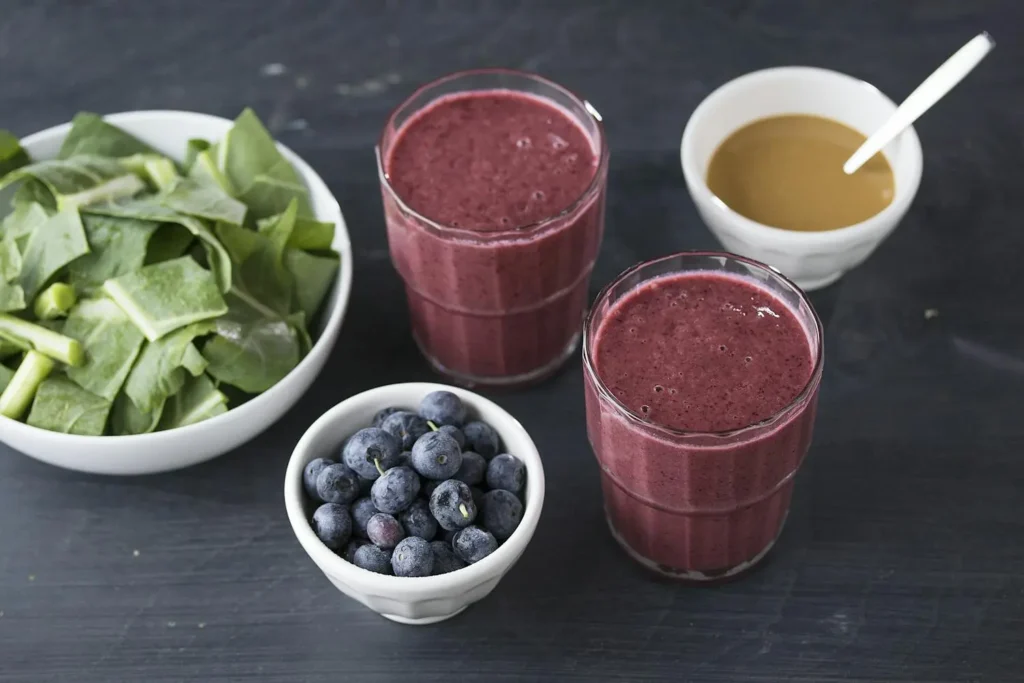Yes, collard greens are low FODMAP and provide a powerhouse of nutrients. If you are looking to increase your intake of green vegetables on the low FODMAP diet, then adding more collard greens to your diet is a perfect way to do it. In this article, we will explore the commonly asked questions regarding collard greens and how to implement this choice on a low FODMAP diet.
What are Collard Greens?
Collard greens or collards are a type of leafy green in the cruciferous vegetable family that are known for their many health benefits. This vegetable is available nearly year-round, but if you are looking to enjoy them seasonally, then purchasing between January and April is ideal for peak freshness.

Calories in a Cup of Collard Greens
According to the USDA food central database, 100g or 3.5 oz of collard greens provides:
- Calories: 32 kcals
- Protein: 3.02g
- Carbohydrates: 5.42g
- Fiber: 4.0g
- Calcium: 232 mg
- Potassium: 213 mg
- Vitamin C: 35.3 mg
- Folate: 129 mcg
- Choline: 23.2 mg
- Vitamin A: 251 mcg RAE (retinol activity equivalents)
- Vitamin K: 437 mcg
- Lutein + Zeaxanthin: 4320 mcg
Collard Greens FODMAP Content
According to the Monash University low FODMAP app, collard greens are listed as a low FODMAP food and can be enjoyed in a low FODMAP serving of 1 cup per meal. At this serving size, collard greens are low in all identified FODMAPs. As you can see, collard greens FODMAP content is low and can be enjoyed on this dietary approach, and provides several important benefits for your body.
What Do Collard Greens Do For Your Body?
Collard greens are an excellent source of antioxidants, including Vitamin A and Vitamin C. According to the Cleveland Clinic, increasing intake of antioxidant-rich foods in the diet can help in lowering inflammation and preventing cellular damage. Additionally, collard greens are low in carbohydrates and would be a suitable option for individuals with Type 2 Diabetes looking for lower glycemic index options.
Collard greens are a wonderful source of calcium and can help individuals who are plant-based or vegetarian increase their intake of dietary calcium from food-based sources. While collard greens’ FODMAP content is low, collards provide an excellent source of dietary fiber. Receiving enough fiber on the low FODMAP diet is important for bowel movement regularity and overall gut health.
According to the National Institute of Health Office of Dietary Supplements, ½ cup of collards provides 530 mcg of Vitamin K, which is more than 4x the dietary allowance of Vitamin K for the day. Vitamin K functions in the body to assist with blood clotting and bone formation.
Lutein and Zeaxanthin are important antioxidants that are also found in a serving of collard greens, and these antioxidants have been shown to help in fighting inflammation and providing protective benefits for eye health.
Does Boiling Collard Greens Destroy Nutrients?
Yes, boiling collard greens can result in a loss of nutrients as many of the vitamins in the greens are water-soluble and those vitamins can be leached out during the cooking process. In an effort to preserve the most nutrients, it is recommended to preserve the cooking liquid and add it back into the dish at the end of the cooking process to retain the most nutrients.
Additional ways to prepare collard greens to preserve the nutrient content include:
- Sauteing
- Steaming
- Chopping finely to add to soups or salads or dressings
- Blending into smoothies
Low FODMAP Collard Green Smoothie Recipe
There are a variety of ways to enjoy collard greens! Please see the smoothie recipe below for a low FODMAP collard green smoothie that can be implemented as a meal or snack choice. This recipe is provided by Nutribullet.

Serving: 1
Prep Time: 5 minutes or less
Cook Time: 1-2 minutes, blend to preferred consistency
Recipe Ingredients:
- 1 cup collard greens
- 1 firm banana, peeled (medium)
- ½ cup strawberries (low FODMAP serving is 5 medium strawberries, which is 2.29 oz)
- ½ cup blueberries (may increase to 1 cup of blueberries as this is the low FODMAP serving size)
- 1.5 cups of water
- ½ cup lactose-free yogurt of choice
- ⅓ cup ice
Instructions:
- Add ingredients to the blender in the order that is listed and blend until smooth
Nutrition Facts:
- Calories: 260 kcals
- Total Fat: 2g
- Total Carbs: 49g
- Dietary Fiber: 7g
- Protein: 16g
FAQ’s:
-
Are collard greens low-carb?
- Yes, collard greens are a low-carb option and low in glycemic index. Collard greens provide 1.95g of carbohydrate per 1 cup serving size.
-
Can you eat collard greens every day?
- This answer depends. Collard greens should be increased slowly in the diet as this food choice contains dietary fiber. Fiber, when added quickly, can result in digestive discomfort and even gas or bloating. Additionally, individuals who are taking blood thinners such as Warfarin need to monitor Vitamin K intake closely. Collard greens are rich in Vitamin K and may interfere with the action of this medication, and may not be a suitable option every day for these individuals. It is best to consult your healthcare provider on recommended amounts of Vitamin K when taking blood thinners.
-
Can you eat collard greens on a low FODMAP diet?
- Yes, collard greens can be consumed on a low FODMAP diet. The Monash University low FODMAP app recommends a low FODMAP serving size of 1 cup per meal.
-
Are collard greens inflammatory?
- No, collard greens are not inflammatory. In fact, collard greens provide excellent sources of antioxidants, including Vitamin A and Vitamin C. Collard greens are anti-inflammatory and may help protect against damage in the body caused by inflammation.
-
Are collard greens good for your colon?
- Yes, collard greens may be good for the colon and gut health, given that collard greens provide an excellent source of dietary fiber, which can help in normalizing bowel movement regularity. Collard greens have anti-inflammatory properties, which may be beneficial in certain GI conditions that are associated with increased inflammation, such as Crohn’s or Ulcerative Colitis, which can impact parts of the colon.
-
Do collard greens make you gassy?
- Yes, collard greens can contribute to bloating and flatulence if this food choice is added in large quantities too quickly. Given that collard greens are a source of dietary fiber it is recommended to introduce fiber slowly and gradually for best tolerance.
-
Are canned collard greens healthy?
- Canned collard greens provide a source of fiber, vitamins, and minerals. However, canned collard greens may be high in sodium if seasoned. Rather, it may be more beneficial to cook collard greens from fresh or choose the frozen and chopped collard greens, which are not pre-seasoned and can help in lowering salt intake.

Conclusions
Collard greens FODMAP content is low, but collards still provide a powerhouse of nutrients that support an extra serving of leafy greens, antioxidants, and fiber when following the low FODMAP diet. Collard greens can be prepared in a variety of ways and enjoyed in numerous dishes on this dietary approach. For further information regarding how to implement low FODMAP foods into your diet and maximize nutrient-dense foods, please consider setting an evaluation with a Registered Dietitian from Health Loft Nutrition.













